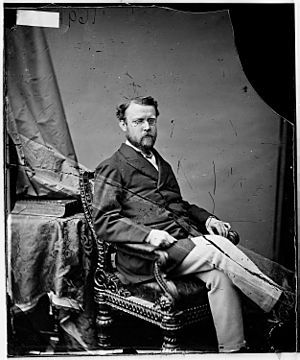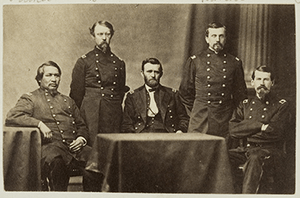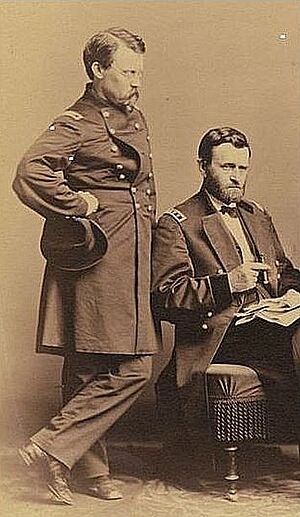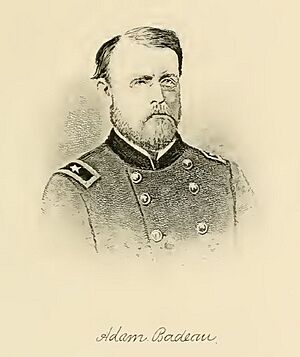Adam Badeau facts for kids
Quick facts for kids
Adam Badeau
|
|
|---|---|
 |
|
| Born | December 29, 1831 New York City, New York |
| Died | March 19, 1895 (aged 63) Ridgewood, New Jersey |
| Buried |
Sleepy Hollow Cemetery's Old Dutch Churchyard, Section D, Lot 65
|
| Allegiance | United States of America |
| Service/ |
Union Army United States Army |
| Years of service | 1862–1869 |
| Rank | |
| Unit | Staff of Thomas W. Sherman Staff of Ulysses S. Grant |
| Battles/wars | American Civil War |
| Spouse(s) | Marie E. Niles (m. 1875) |
| Other work | Writer Diplomat |
Adam Badeau (December 29, 1831 – March 19, 1895) was an American writer, soldier, and diplomat. He is best known for working closely with Ulysses S. Grant during the American Civil War. He also wrote a three-book series about Grant. Adam Badeau was a successful writer. He even helped Grant write his famous Personal Memoirs of Ulysses S. Grant by checking facts and editing.
Badeau grew up in New York City, Tarrytown, and Sleepy Hollow. He worked for the New York City Street Department while studying law. After becoming a lawyer, he also started writing. His early work as a theater critic appeared in Noah's Sunday Times.
During the Civil War, Badeau joined the Union Army. His writing skills made him a valuable staff officer. He first worked for Thomas W. Sherman, then for Ulysses S. Grant. He fought in several battles and rose from captain to brevet brigadier general. After the war, Badeau became a U.S. Consul in London for many years. He also served as U.S. Consul in Havana, Cuba. Badeau continued to write many essays and books. In the mid-1880s, he helped Grant with his memoirs. However, they had a disagreement about payment and how Badeau would be credited. He later sued Grant's family and won payment. Badeau died in Ridgewood, New Jersey, and was buried in Sleepy Hollow Cemetery.
Contents
Early Life and Education
Adam Badeau was born in New York City on December 29, 1831. He first had private teachers. Later, he went to boarding schools in Tarrytown. He then moved to North Tarrytown, which is now Sleepy Hollow.
While living there, he worked as a clerk for New York City's Street Department. He also studied law and became a lawyer in 1855. Besides his legal work, Badeau was a writer. He wrote essays and theater reviews for Noah's Sunday Times.
Military Service in the Civil War
In 1862, Adam Badeau joined the Union Army during the American Civil War. He was made a captain. He served on the staff of General Thomas W. Sherman. Badeau took part in important battles like the Siege of Corinth, Mississippi. He also helped defend New Orleans.
Later, he fought in the Siege of Port Hudson, where he was badly wounded. After he recovered, in March 1864, Badeau joined Ulysses S. Grant's staff. He became a brevet lieutenant colonel and Grant's military secretary. During this time, Badeau and Grant became close friends.
Badeau was part of the Wilderness and Appomattox campaigns. He was promoted to brevet colonel. He stayed on Grant's staff until 1869. He left the Army because of his wound from Port Hudson. He held the permanent rank of captain and the brevet rank of brigadier general.
Life After the Civil War
After the Civil War, Badeau continued to work for General Grant. He started writing a military history of Grant. Grant himself reviewed the book as Badeau wrote it. When Grant became President, Badeau was sent to London, England. He worked at the United States embassy there from May to December 1869. This allowed him to keep working on Grant's history.
In 1870, he became the U.S. Consul in London. He held this job until 1881. During this time, he took a break from 1877 to 1878. He traveled with Grant for part of Grant's trip around the world. Badeau also hosted Grant several times when Grant visited England.
Badeau was offered jobs as a U.S. Minister to Belgium in 1875 and to Denmark in 1881. However, he turned down both offers. From 1882 to 1884, he was the U.S. Consul in Havana, Cuba. Badeau resigned from this job. He claimed that officials in the State Department were involved in dishonest dealings with Cuba and Spain. He said the department did nothing when he reported his concerns.
Badeau then helped Grant prepare his famous memoirs. However, Grant ended their working relationship before the book was finished. They disagreed about how much Badeau would be paid. They also argued about how he would be credited for his editing and research.
Grant had signed an agreement to pay Badeau $10,000 from the book's sales. As the Memoirs became very successful, Badeau asked for a new deal. He wanted $1,000 a month plus 10% of the profits. Grant thought this was too much. He also disliked news reports that suggested Badeau was the real author of the book. Grant stopped working with Badeau and refused to pay him the $10,000. When the Memoirs earned a lot of money, Badeau sued Grant's family. Grant's wife eventually paid him the $10,000 plus interest.
Author and Journalist
Badeau knew many famous people, including Ulysses S. Grant and actor Edwin Booth. He wrote many books, both fiction and non-fiction. He also wrote articles for newspapers and magazines. Some of his books include:
- The Vagabond (1859)
- Military History of Ulysses S. Grant (three volumes, 1881)
- Aristocracy in England (1885)
- Conspiracy: A Cuban Romance (1885)
- Grant in Peace: From Appomattox to Mount McGregor (1887)
The last book was subtitled A Personal Memoir. It covered Grant's life after the war and his interactions with important people. Badeau sometimes wrote for the New York Sunday Times using the pen name The Vagabond.
Later Years and Death
In his final years, Badeau continued to write. He often contributed to magazines and wrote about his experiences during the war. His constant writing strained his eyes. He developed cataracts in the winter of 1894-1895. He had operations to remove them, which weakened his health.
Adam Badeau died suddenly from apoplexy on March 19, 1895. He was 63 years old. He passed away in Ridgewood, New Jersey. He was buried in Sleepy Hollow Cemetery's Old Dutch Churchyard.




